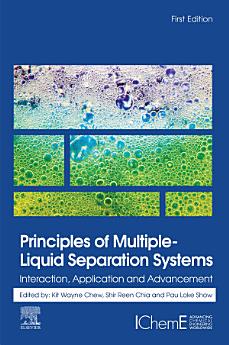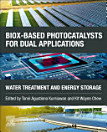Principles of Multiple-Liquid Separation Systems: Interaction, Application and Advancement
About this ebook
About the author
Dr. Kit Wayne Chew is Assistant Professor in Nanyang Technological University’s School of Chemistry, Chemical Engineering and Biotechnology. He obtained his PhD from the University of Nottingham, where he began his research in sustainable bioprocess engineering for food and pharmaceutical products. His current research examines the utilization of algae biotechnology to develop cost-effective and environmentally friendly methods for the synthesis of functional ingredients. Dr. Chew’s professional appointments include Associate Member in the Institution of Chemical Engineers Malaysia (IChemE), Graduate Engineer registered with the Board of Engineers Malaysia, and Graduate Technologist registered with the Malaysia Board of Technologies. He is listed as the #5 author contributing research on the topic of “Microalgal Technology on SciVal.
Dr. Shir Reen Chia is a research associate at the Department of Chemical and Environmental Engineering, Faculty of Engineering, University of Nottingham Malaysia (UNM). Her research focuses on downstream processing of biomolecules. She is working on the utilization of liquid bi-and triphasic partitioning of biomolecules from biomass.
Professor Ir. Ts. Dr. Pau-Loke Show is currently a Full Professor in the Department of Chemical and Petroleum Engineering at Khalifa University, Abu Dhabi, United Arab Emirates. Also, he has been affiliated with University of Nottingham Malaysia, where he is the Professor of Biochemical Engineering. He is also the former President and Founder of International Bioprocessing Society based in Malaysia. Prof Ir. Ts. Dr. Show has successfully obtained his PhD in two years’ time after obtaining his bachelor’s degree from Universiti Putra Malaysia. In the year of 2022, he was elected as a Fellow of the Institution of Chemical Engineers IChemE (FIChemE). He is currently a Professional Engineer (PEng) registered with the Board of Engineers Malaysia (BEM), Chartered Engineer of the Engineering Council UK (CEng), Corporate Member of The Institution of Engineers, Malaysia (MIEM), and Professional Technologist (PTech) registered with the Malaysia Board of Technologists (MBOT). Prof Ir. Ts. Dr. Show obtained the Post Graduate Certificate of Higher Education (PGCHE) in 2014 and is now a Fellow of the Higher Education Academy (FHEA) UK. For more information, please refer to the follow webpage: https://showpauloke.com/




